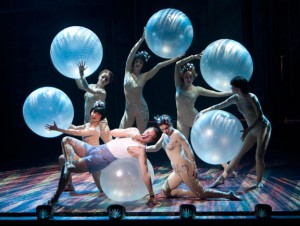For almost 14 years the Broadway revival of “Chicago” — the jazzy musical by Fred Ebb, John Kander and Bob Fosse — has invited audiences to a world where scintillating sinners wear their buckle shoes and get away with naughty things. The revival, which was darker than the original “Chicago,” set an unshakable image of what a production of the show looks like: lots of black, lots of sexy and very little set.

Ithaca College’s rendition of the Broadway classic does away with most of the bare-bones bandstand-style presentation of the revival and instead flaunts a more whimsical, colorful palette like the original 1975 production. Though the intention of the college’s production was to deviate from the traditional look of the popular revival, it proved that sometimes there’s no need to fix what isn’t broken.
Directed by Greg Bostwick, professor of theater arts, the college’s take on “Chicago” uses a “show-within-a-show” motif that emphasizes the Brechtian disregard of the fourth wall. Bostwick’s approach to the musical has its moments of riotous fun — most notably the show-stopping number “Both Reached for the Gun,” with strong choreography by associate professor Mary Corsaro — but the production lacks a clear-cut execution of its vaudeville concept.
The story hasn’t changed, though. Roxie Hart (senior Megan Watt) and Velma Kelly (senior Rebecca Futterman) are still two murderesses battling for the spotlight. Corrupt lawyer Billy Flynn (junior Danny Lindgren) juggles their trial dates as the ladies wax and wane in and out of popularity with the disillusioned, sensationalist press.
Each of the main actors brings a fresh adaptation to the characters. Watt’s Roxie is brash, bubbly and a little ditsy, as evidenced in her first number, “Funny Honey,” an homage-turned-rant to her husband Amos. Instead of gracefully caressing the piano she sings on top of, she fumbles and falls off its back. Watt’s voice is spot-on and powerful throughout, but her voice doesn’t make up for her acting choices that aren’t as true to Roxie’s inherent sensuality.
Futterman delivers her lines with a good mix of tongue-in-cheek personality and desperation, but, unfortunately, she isn’t the best vocal match for Velma. She struggles with the higher notes that define songs like “All That Jazz” and “I Can’t Do It Alone.” Velma is a tough act to pull off, and though Futterman makes an effort, she doesn’t quite pack the proverbial “umph” that makes Velma shine.
Lindgren plays a fast-talking Flynn with his tenor voice soaring through the theater almost effortlessly in “All I Care About.” He embodies the lawyer right down to his sharp lapel. Some supporting characters are added treats, like senior Jessica Bennett’s saucy Mama Morton and senior Tim Quartier’s show-stealing portrayal of a downtrodden Amos in “Mister Cellophane.”
One of the clear selling points of this production was the line-up of accomplished alumni who formed the technical aspects of the show. From stellar lighting design by Paul Gallo ’74 to a two-tiered grungy jail set by Daniel Meeker ’95, spectacle is the name of the game in this production.
Dazzling marquis lights line the sides of the Hoerner Theatre proscenium and set pieces come from right, left, above and below, making this “Chicago” one of the most elaborately designed productions in recent college history.
The costumes, designed by Kara Harmon ’05, are many in number and beautifully constructed but suffer from a weak production concept rather than their actual quality. It’s never clear which songs are supposed to be more vaudeville and less “reality,” which makes the costume choices for each number seem arbitrary.
“Chicago” is a difficult show to use as the basis for experimentation. But with an array of talented students and alumni, it’s clear where the temptation to wow the audience with a new concept may have come from. Though this concept doesn’t come through clearly, the show is still a grand time filled with sex, booze and laughs. And that’s showbiz, kid.




